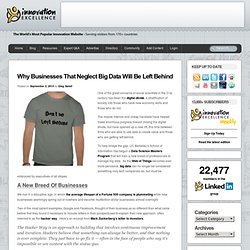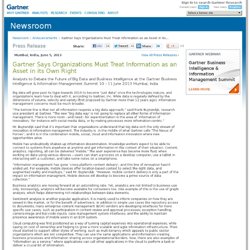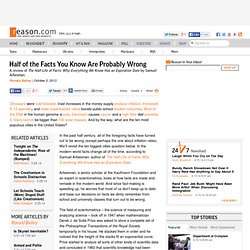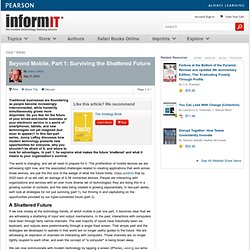

Why Businesses That Neglect Big Data Will Be Left Behind. One of the great concerns of social scientists in the 21st century has been the digital divide, a stratification of society into those who have new economy skills and those who do not.

The mobile internet and cheap handsets have helped make enormous progress toward closing the digital divide, but have opened up a new rift, this time between firms who are able to use data to create value and those who are getting left behind. To help bridge the gap, UC Berkeley’s School of Information has begun a Data Science Masters Program that will train a new breed of professionals to manage big data.
As the Web of Things becomes ever more pervasive, big data can no longer be considered something only tech companies do, but must be embraced by executives of all stripes. A New Breed Of Businesses We live in a disruptive age, in which the average lifespan of a Fortune 500 company is plummeting while new businesses seemingly spring out of nowhere and become multibillion dollar businesses almost overnight.
Big Data and the Accidental Architecture. Pareto analytics tool. BI Strategy. RoI. Says Organizations Must Treat Information as an Asset in its Own Right. Mumbai, India, June 5, 2013 View All Press Releases Analysts to Debate the Future of Big Data and Business Intelligence at the Gartner Business Intelligence & Information Management Summit 10 - 11 June 2013 Mumbai, India Big data will grow past its hype towards 2016 to become “just data” once the technologies mature, and organizations learn how to deal with it, according to Gartner, Inc.

While data is regularly defined by the dimensions of volume, velocity and variety (first proposed by Gartner more than 12 years ago), information management concerns must be much broader. “The bottom line is that not all information requires a big data approach,” said Frank Buytendijk, research vice president at Gartner. “The new “big data way’ is not going to replace all other forms of information management. Mr. Mobile has undoubtedly shaken up information dissemination. “Information management has gone ‘cross-platform content delivery’, and this line of innovation hasn't ended yet. However, Mr.
Computer scientists discover statistics and find it useful. This article in the New York Times today describes some of the advances that computer scientists have made in recent years. The technology, called deep learning, has already been put to use in services like Apple’s Siri virtual personal assistant, which is based on Nuance Communications’ speech recognition service, and in Google’s Street View, which uses machine vision to identify specific addresses.But what is new in recent months is the growing speed and accuracy of deep-learning programs, often called artificial neural networks or just “neural nets” for their resemblance to the neural connections in the brain.
Deep learning? Really? Okay, names aside, there are a few things to say here. First, the advances described in the article are real--I think that's clear. The question is how did we get here? Did Nate Silver produce a better prediction of the election than the pundits because he had better models or better technology?
DRM. Legislation. Big Data. Half of the Facts You Know Are Probably Wrong. Dinosaurs were cold-blooded.

Vast increases in the money supply produce inflation. Increased K-12 spending and lower pupil/teacher ratios boosts public school student outcomes. Most of the DNA in the human genome is junk. Saccharin causes cancer and a high fiber diet prevents it. Stars cannot be bigger than 150 solar masses. In the past half century, all of the foregoing facts have turned out to be wrong (except perhaps the one about inflation rates). Arbesman, a senior scholar at the Kaufmann Foundation and an expert in scientometrics, looks at how facts are made and remade in the modern world.
The field of scientometrics – the science of measuring and analyzing science – took off in 1947 when mathematician Derek J. de Solla Price was asked to store a complete set of the Philosophical Transactions of the Royal Society temporarily in his house. In other words, half of what physicians thought they knew about liver diseases was wrong or obsolete 45 years later. Beyond Mobile, Part 1: Surviving the Shattered Future.
Traditional businesses are floundering as people become increasingly interconnected, while humanity simultaneously grows more disjointed.

Do you fear for the future of your bricks-and-mortar business or your electronic service in a world of smartphones, tablets, and new technologies not yet imagined (but soon to appear)? In this two-part series, Jonny LeRoy discusses how modern technology presents new opportunities for everyone, why you shouldn't be afraid of it, and where to look for advantages. In part 1, he explains what makes the future 'shattered' and what it means to your organization’s survival. The world is changing, and we all need to prepare for it. The proliferation of mobile devices we are witnessing right now, and the associated challenges related to creating applications that work across those devices, are just the thin end of the wedge of what the future holds.
A Shattered Future Outputs from the cloud are following a similar trajectory.